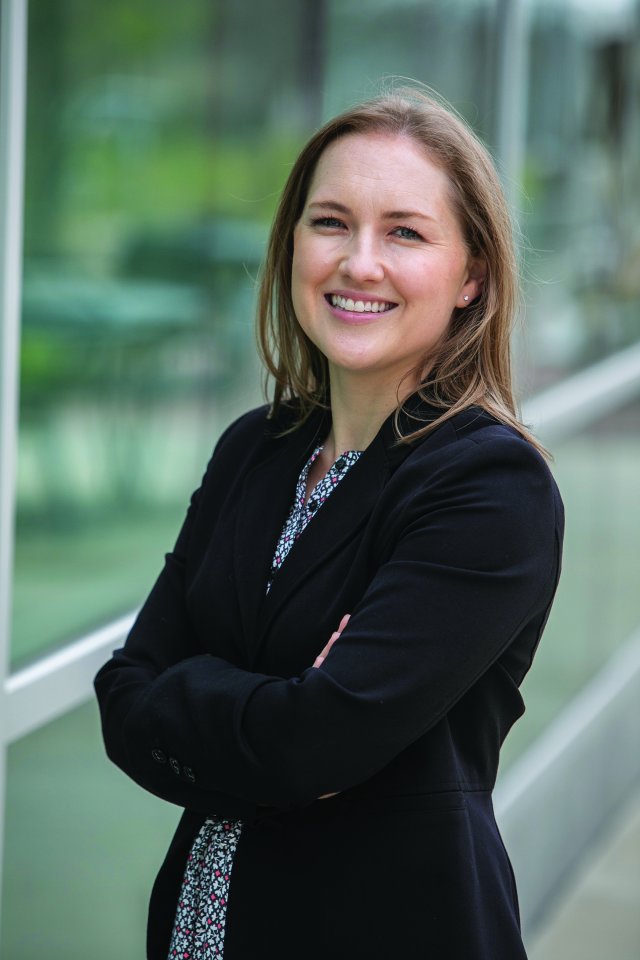Major Impact
New public health minor helps students promote well-being in diverse communities.

Jennie (Metzgar ’08) Torti was invited to teach the introductory class in the fall, before the public health minor was approved.
Photo: Brian Stethem ’84Olivia Chee used to have an uncomplicated definition of “public health.”
“I took it very literally,” said the freshman biological sciences major. “I thought it was about public health care programs and not making other people sick.”
But after taking Cal Lutheran’s Introduction to Public Health class during the fall 2020 semester, she’s developed a new interpretation: “It means striving for equity.”
Public health covers vaccinations and other topics related to communicable diseases and preventive health, Chee said, “but goes so much deeper than that.” The field also explores “the socioeconomic status of communities” — how people from poorer neighborhoods, or racial or ethnic minorities, are often at a disadvantage when it comes to health care and negative environmental problems such as air or water pollution.
So when Chee, who wants to become an OB-GYN, learned that Cal Lutheran was introducing a minor in public health starting with the spring 2021 semester, she eagerly signed up.
Adina Nack, a Cal Lutheran sociology professor, spearheaded efforts to create the program.
“As a medical sociologist, I look for the ways in which one’s personal illness experiences connect with larger social problems, including systemic inequities that result in health disparities,” Nack said. “Collaborations with different health care professionals — from physicians and nurses, to social workers and mental health practitioners — taught me the value of being able to draw on knowledge from the health sciences, social and behavioral sciences, ethicists and artists.”
The new interdisciplinary minor isn’t just for students who want to be doctors or nurses. Knowledge of public health is beneficial across many subjects and majors, including biology, chemistry, communication, environmental science, exercise science, psychology and sociology.
Nack invited her former Cal Lutheran student Jennie (Metzgar ’08) Torti to teach the introductory class in the fall. Torti, who earned her master’s degree in public health at California State University, Northridge, is a public health educator at St. John’s Regional Medical Center in Oxnard; she’s especially interested in pregnancy and postpartum health.
Discussion about the public health minor was in the works before the coronavirus pandemic walloped the world with a real-life crisis. Torti, who taught her fall class remotely, found plenty of timely material to make the course relevant to students. Suddenly, the history of the 1918 Spanish flu, controversies about vaccines, and statistics related to the social determinants of health no longer seemed abstract.
“Every student could engage in the material from both an academic and personal perspective,” Torti said. “With the pandemic, people are getting an understanding of the role public health plays in our lives.”
Sophomore Cheyenne Wierzbicki, a sociology major, was a student in Torti’s class and among the first students to select the public health minor.
Wierzbicki, who eventually wants to earn a doctorate in medical sociology, said she’s been showering her family with COVID-19-prevention statistics, such as the efficacy of mask-wearing.
Like Chee, she felt especially enlightened to learn about what she now considers the biggest health problem in our country: the effect of race and socioeconomic status on health care. “The more money you have, the better health care you have,” she said.
The study of public health can lead to jobs in research, environmental science, education, nutrition, community planning, social work, epidemiology, occupational health, policymaking, mental health, substance abuse prevention, policing and more.
Some of the elective classes Cal Lutheran students can take to fulfill the public health minor include Statistics for the Sciences, Sexuality and Society, Persuasive Communication, Deviance in U.S. Society, Substance Abuse, Nutrition, Bioethics and Sport Psychology.
“Public health looks at the health of a community, whereas medical doctors diagnose and treat individuals,” Torti said. “For students going into medicine, understanding the factors affecting an individual’s health at a community level — where they live, work and play — broadens their perspective.”
She said public health is also a key topic for students interested in environmental science, sociology and psychology because they need to “understand how the health of a community impacts daily life.”
Public health might be a “minor” at Cal Lutheran, but the potential positive health effects are major.
Karen Lindell has been a newspaper, magazine and website writer and editor for more than 15 years, including work at the Ventura County Star, L.A. Parent magazine, Los Angeles Times, Ojai Valley News, VC Reporter and Ranker.com. She lives in
Los Angeles.